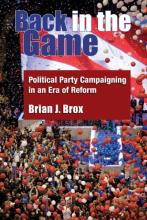Brian Brox
Associate Professor & Director of Undergraduate Studies

Education
The University of Texas at Austin
Trinity University
Articles
Polling in Impossible Conditions: Pre-election Polling in New Orleans after Hurricane Katrina
2015
Just months after Hurricane Katrina made landfall, New Orleans held a mayoral election. With so many displaced residents, it was difficult to gauge attitudes, but there are perhaps few more important situations in which the public’s attitudes need to be examined. This paper examines the methodological challenges with survey research in the aftermath of a natural disaster. We conducted a traditional survey just days before the election and attempted to correct for our inability to reach particular segments of the population through post-stratification weights. The results of our poll were relatively accurate for all of the candidates but one – the winner. We recommend in the aftermath of a disaster that researchers provide not only a range of possible outcomes, but also that they should consider other methods, such as focus groups, and alter the usual questions to account for the post-disaster context. Given that the opinion environment after a major disaster is marked by indecision and confusion, it is not surprising that respondents were unsure of their vote choice and/or changed their mind just before the election. Our experience should provide some caution to researchers seeking to measure opinion in these circumstances.
Reducing the Costs of Participation: Are States Getting a Return on Early Voting?
2010
The authors address the puzzle of why governments have implemented methods of early voting when those methods appear not to have an effect on turnout. Using an aggregate analysis, the authors find that early voting seems to produce a short-lived increase in turnout that disappears by the second presidential election in which it is available. They also address whether the additional costs to government are worth the negligible increase in participation. They conclude that these reforms merely offer additional convenience for those already likely to vote.
Late Deciders in U.S. Presidential Elections
2009
Despite their obvious importance in close elections, previous research into late-deciding voters has come to quite disparate conclusions regarding their traits, attitudes, and behavior. We seek to clear up this confusion through an analysis of late-deciding voters in U.S. Presidential elections from 1988 to 2004. Moving past cursory analyses that treat late deciders as a monolithic group, we divide late deciders by level of interest in the campaign. Low-interest late deciders have few demographic distinctions from other voters but are less connected to and active in politics. They tend to make vote choice decisions based on party identification and issue evaluations. High-interest late deciders look remarkably like those voters who decide earlier in the campaign: politically knowledgeable and attentive to the campaign. They make vote choice decisions based on party identification and evaluations of the economy. Our findings suggest that analyses that fail to account for the two different groups of late deciders risk mischaracterizing their attitudes and behavior. Despite their obvious importance in close elections, previous research into late-deciding voters has come to quite disparate conclusions regarding their traits, attitudes, and behavior. We seek to clear up this confusion through an analysis of late-deciding voters in U.S. Presidential elections from 1988 to 2004. Moving past cursory analyses that treat late deciders as a monolithic group, we divide late deciders by level of interest in the campaign. Low-interest late deciders have few demographic distinctions from other voters but are less connected to and active in politics. They tend to make vote choice decisions based on party identification and issue evaluations. High-interest late deciders look remarkably like those voters who decide earlier in the campaign: politically knowledgeable and attentive to the campaign. They make vote choice decisions based on party identification and evaluations of the economy. Our findings suggest that analyses that fail to account for the two different groups of late deciders risk mischaracterizing their attitudes and behavior
The Contemporary Effects of Vice Presidential Nominees: Sarah Palin and the 2008 Presidential Campaign
2009
This paper reviews the politics of vice-presidential selection from the point of view of both the scholar and campaign strategist. Using John McCain's selection of Sarah Palin as his running mate in 2008, we first explore academic theories of vice-presidential selection and assess the ways Palin either succeeds or fails to meet the expectations of those theories. We go on to explore the specific factors the McCain campaign considered when selecting a vice-presidential nominee and assess Palin's performance in addressing those factors. We conclude with a discussion of Palin's impact on the outcome of the 2008 election.
Elections and Voting in Post-Katrina New Orleans
2009
New Orleans suffered three catastrophic events in the late summer of 2005. Hurricane Katrina made landfall just east of the city on August 29th. The next day, the protective levees surrounding the city failed due to Katrina’s pounding. And on September 24th, Hurricane Rita made landfall near the Texas Louisiana border, its outer bands of rain causing the recently patched levees to fail and reflood much of the city. As a result the physical infrastructure ofNew Orleans was devastated and its population was scattered far and wide.
Media Appearances
Here's how Louisiana could impact the impeachment inquiry of President Donald Trump
“The biggest thing to take out of that is the incredibly polarized nature of our politics,” said Brian J. Brox, associate professor of political science at Tulane University. “It’s going to take a lot of scandal, a lot of evidence, a real smoking gun to change that.”
As Congressional Black Caucus chair, Cedric Richmond steps forward to cut a national figure
Richmond’s elevation to Congressional Black Caucus came as the country’s electorate is deeply polarized “not just partisanly but racially,” said Brian Brox, a political scientist at Tulane University. Trump’s campaign messages deepened that divide, Brox said, by explicitly or unintentionally tapping into “a white class-consciousness.”
In the News
Jewish Insider: Left-wing groups pour money into Louisiana special election
Learning English: A Clinton finds a changing Democratic party
Fox News: Community organizer elected New Orleans' first woman mayor
Vox: Democrats are mounting a last-ditch effort to win Louisiana’s Senate seat
NOLA.com: Recalling Mike Yenni not an easy task, experts say
NOLA.com: 'Failure is not an option:' Scalise plays key role in Obamacare fight
Voice of America – Learning English: Trump is a big issue in US Congressional elections
The Advocate: Louisiana's unique 'jungle primary' system could be on its way out
Yahoo News: Who is Wayne Tracker? Tillerson's pseudonym puts Exxon emails at fore of investigation

